|
|
|
Sort Order |
|
|
|
Items / Page
|
|
|
|
|
|
|
| Srl | Item |
| 1 |
ID:
144680
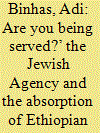

|
|
|
|
|
| Summary/Abstract |
This article addresses the question of how the Israeli government and the Jewish Agency for Israel (JAFI) handled the absorption of Ethiopian immigrants in the early 1990s. It shows that, reflecting the historic rivalry between the two organizations, their interaction lacked a clear division of roles and was mired by rivalry and conflicting interests. As a result, the individual immigrant, besides dealing with predictable absorption difficulties, had to cope with bureaucratic failures.
|
|
|
|
|
|
|
|
|
|
|
|
|
|
|
|
| 2 |
ID:
144684
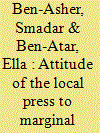

|
|
|
|
|
| Summary/Abstract |
This article examines the 2001‒2003 coverage by the local press in the Haifa region of the struggle of the fishermen who claimed to have contracted cancer as a result of coming into contact with the polluted water of the Kishon River. It shows that the local press chose to deliver to its readers an ‘interpretive package’ that portrays the fishermen as ‘The River’s Heroes’, a group fighting for justice and morality for the benefit of all. However, alongside the favourable framing were also some of the writers’ stereotypical elitist perceptions, at times explicit and at others implicit, of the fishermen. In the case of the Kishon fishermen, whereas the local press played an important role in covering their struggle, it only partially presented the solidarity dimension wherein the differences between people and groups constitutes the basis for moral relations between them.
|
|
|
|
|
|
|
|
|
|
|
|
|
|
|
|
| 3 |
ID:
144679


|
|
|
|
|
| Summary/Abstract |
Longing is a neglected subject in psychological research and theory despite the fact that it is an important component of human life. Drawing on clinical examples, this article offers thoughts on the place of longing in the lives of Holocaust child survivors and those of second-generation offspring of survivors. The first part describes the concept of longing and its distinction from nostalgia and desire, while the second part uses some clinical examples to describe patterns of avoidance of longing: prohibition, denial, superficial contacts, avoidance and inability to separate. The article ends with an examination of healthy, adaptive aspects of longing that can be used for a richer, healthier life.
|
|
|
|
|
|
|
|
|
|
|
|
|
|
|
|
| 4 |
ID:
144685
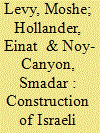

|
|
|
|
|
| Summary/Abstract |
This article seeks to explore the meanings of ‘masculinity’ as constructed by Israeli men in the sports arena. Specifically, it examines the place of sport in the lives of Israeli men as well as the factors and motivations driving them to this field. The research findings indicate a dialectical process that combines continuity and change in Israeli masculinity: on the one hand, a close connection between sports and ‘traditional masculinity’ that includes themes of physical strength and male brotherhood; on the other, diversity in sports practices, links between sport practices and personal well-being, weakening of the identification with specific sports teams and a tendency to watch sports broadcasts in a more individualized manner based on aesthetic preferences.
|
|
|
|
|
|
|
|
|
|
|
|
|
|
|
|
| 5 |
ID:
144681


|
|
|
|
|
| Summary/Abstract |
Sheikh Yusuf Qaradawi, widely considered the most influential Islamic scholar alive today, is the author of over 120 books and a spiritual leader of the Muslim Brotherhood. He is a member of many international Muslim organizations and the sharia advisor for a number of Islamic banks. Qaradawi is considered a part of the political centre (wasatiyya), positioned between those relying on ancient sunna and Qur’an (salafiyya) sources and the more moderate new stream. His sermons are broadcast live on television to millions of Muslims throughout the world. He also appears on a popular weekly television show dealing with current affairs regarding the sharia on the Al Jazeera network. His beliefs about the Palestinian‒Israeli conflict exert great influence over the Muslim public across the globe. This article represents his views and explains why the war against Israel is so important to the Islamic world.
|
|
|
|
|
|
|
|
|
|
|
|
|
|
|
|
| 6 |
ID:
144676


|
|
|
|
|
| Summary/Abstract |
In June 2004 the Israeli government decided to dismantle all of the Israeli settlements in the Gaza strip. During the year between the government’s decision and the implementation of this policy, ardent supporters and opponents of the move sought to sway a divided Israeli public through public relations campaigns promoting their positions. One of the central components of the government’s campaign supporting the pullout from Gaza was that it would advance the development of Israel’s southern Negev region. Promotion of the policy as a means for development of the Negev tied into Israel’s long-standing population dispersal policy, which has been a policy paradigm for land use and development in Israel since the state’s founding. This paper examines the way in which development of the Negev was used to advance the Gaza pullout and the degree to which this development was implemented in the years following the pullout. Analysis of the Israeli case is used illustrate the strategic influence of policy paradigms in public policy implementation.
|
|
|
|
|
|
|
|
|
|
|
|
|
|
|
|
| 7 |
ID:
144671
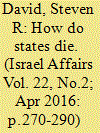

|
|
|
|
|
| Summary/Abstract |
Israel is one of the only countries whose continued existence is called into question. The history of state death and particularly the record of state death since the end of the Cold War provide insights into the kinds of threats that are most likely to bring about the demise of countries in the twenty-first century, including Israel. This record suggests that armed conquest is no longer a principal danger to countries. Instead, state death is more likely to arise by a peaceful decision to end the state. The reasons for this decision vary case by case, but changes in the policy of a great power, ethnic strife, and a growing belief in the illegitimacy of the country’s right to exist have all played key roles in recent state deaths. Israel struggles with each of these issues, making the lessons of state death especially relevant for its future. By learning from the experience of state deaths, Israel can best assess its own vulnerabilities and determine what it needs to do to maximize its prospects for survival.
|
|
|
|
|
|
|
|
|
|
|
|
|
|
|
|
| 8 |
ID:
144678


|
|
|
|
|
| Summary/Abstract |
Israel and the Islamic Republic of Iran have had a problematic relationship for the last four decades. Despite their tense relations, Israel is home to thousands of Persians and Iran has the second largest Jewish population in the Middle East. There are social, political and psychological obstacles to dual identification. Using qualitative thematic analysis and Identity Process Theory, this article examines the construction and management of Persian/Iranian and Jewish/Israeli identities among these groups. The following themes are discussed: (1) the challenges and maintenance of dual identification, (2) breaking down boundaries between identities, and (3) Persian-Iranian or Jewish-Israeli? Establishing coherence in identity. Results suggest that, while the social and political institutions in Iran and Israel construct barriers to dual identification, individuals deploy creative strategies for constructing an ethnic identity that acknowledges both components of their heritage. The implications for self-identity are discussed.
|
|
|
|
|
|
|
|
|
|
|
|
|
|
|
|
| 9 |
ID:
144682
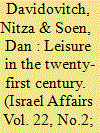

|
|
|
|
|
| Summary/Abstract |
The article deals with the concept of leisure in Israel in terms of time, activity, state of mind, and values. The purpose is to examine changes in how leisure has been conceived in Israel during its 65 years of existence. Which factors have shaped concepts of leisure and styles of leisure in Israel, a country with cultural foundations in both tradition and modernity, and one that encompasses a social culture consisting of new and veteran immigrants, minorities, religious and secular populations? The article examines Israel’s culture of leisure and its transformations. It may have practical implications for the educational challenge of imparting leisure behaviours, promoting understanding and tolerance of those different than us – and possibly even imparting ideal leisure practices.
|
|
|
|
|
|
|
|
|
|
|
|
|
|
|
|
| 10 |
ID:
144683


|
|
|
|
|
| Summary/Abstract |
This article examines the reasons why the Israeli government chose not to apply for membership in the International Energy Agency (IEA), though it has been eligible to do so since 2010. The many benefits the IEA has to offer Israel in terms of enhancing its energy sector’s security, advancing environmental policies, and further integrating it with international markets and standards indicate that Israel would be wise to join the agency. A number of examples of the problematic process by which energy and environmental policy decisions are made in Israel will be used to illustrate this argument. Despite these benefits, Israel has rejected any notion of membership following a 2010 interdepartmental discussion between several ministries. The arguments raised during these discussions help shed some light on how the ‘security-mindset’ that tends to dominate Israeli policymaking serves as a limit to Israel’s potential progress of both its energy sector and its environmental policies.
|
|
|
|
|
|
|
|
|
|
|
|
|
|
|
|
| 11 |
ID:
144674
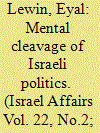

|
|
|
|
|
| Summary/Abstract |
In societies marked by numerous diversities, like the Jewish-Israeli one, understanding social cleavages might show a larger picture of the group and form a broader comprehension of its characteristics. Most studies concentrate on somewhat conventional cleavages, such as the socioeconomic cleavage, the ethnic cleavage, the religious or the political one; this article, by contrast, suggests a different point of view for the mapping of social cleavages within Israeli society. It claims that the Jewish population in Israel is split into two competing groups: stakeholders versus deprived. These categories of social identity are psychological states of mind in which no matter how the national resources are distributed, the stakeholders will always act as superiors, even if they are in inferior positions, while the deprived will always take the role of eternal underdog even if all of the major political ranks come under their control. This article brings about a review of over a century of ideological debates within the Zionist movement; it reveals how understanding the logic of the Israeli political discourse as a competition between the two newly defined social groups enables a better comprehension of the inherent tension between them.
|
|
|
|
|
|
|
|
|
|
|
|
|
|
|
|
| 12 |
ID:
144677
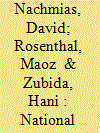

|
|
|
|
|
| Summary/Abstract |
Israeli national parties show a high variance in their tendency to compete in local elections for local authorities’ mayoral position and council seats. Indeed national parties can use local electoral competition to garner support for national elections. However, national parties might be also exposed to local losses and commitments which will hurt their performance in national elections. The results of Israeli ballot-box data from the 2006 national and the 2008 local elections show that Israeli national parties’ decision whether to compete in local elections is affected by the local support patterns in national elections, parties’ valence and the locality’s peripherality.
|
|
|
|
|
|
|
|
|
|
|
|
|
|
|
|
| 13 |
ID:
144673
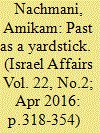

|
|
|
|
|
| Summary/Abstract |
Various factors shape European and Muslim migrant relations; one of these is European‒Jewish and European‒Israeli precedents. Hitherto, this factor has not been thoroughly discussed. This article focuses on the use of recent and past histories, by all sides, when describing present and future relations between the European majority and Muslim migrant minority. This discourse often makes reference to European Jewry as a guiding precedent, as well as to Israeli Middle Eastern policies. As a result, a meaningful triangle has been formed, whose sides consist of Europeans, Muslim immigrants and Jewish communities. The shared issues between them include the painful record of European‒Jewish relations and its implications for the European‒Muslim encounter; the Holocaust; the European Right, its agendas concerning Jews, Muslim immigration and its surprising contacts with the State of Israel; European restrictions against Muslim and Jewish worship and religious rites; among others. Repeatedly, the Muslim issue in Europe is referred to as the Continent’s ‘new Jewish problem’. Moreover, the contemporary integration experience of Muslim migrants in Europe is compared to that of Jews in earlier ages.
|
|
|
|
|
|
|
|
|
|
|
|
|
|
|
|
| 14 |
ID:
144672
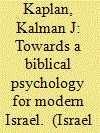

|
|
|
|
|
| Summary/Abstract |
This article examines the dependence of modern psychology and psychiatry on Greek thought, and specifically call for a Biblical reformulation of mental health with regard to 10 areas: (1) God, nature and creation; (2) men and women; (3) obedience versus disobedience; (4) fathers and sons; (5) mothers and daughters; (6) sibling rivalry and its resolution; (7) self and other: cycle versus development; (8) body and soul; (9) freedom, life and suicide; and finally (10) a hopeful versus a tragic outlook on life.
|
|
|
|
|
|
|
|
|
|
|
|
|
|
|
|
| 15 |
ID:
144670
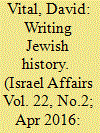

|
|
|
|
|
| Summary/Abstract |
The contemporary proliferation of Jewish studies notwithstanding, the history of the Jews in modern times is still far too widely seen as an offshoot ‒ if not a function ‒ of the history or histories of others. And yet, if their evolving history is to be taken seriously, the Jewish side of things needs to be examined before all else in the light of what the Jews themselves ‒ and most especially their own leaders ‒ did, or failed to do, in the light of what were arguably their own collective interests. And this, most especially, in what deserves to be reckoned the political sphere of things. For while the old fundament of relations between Jews and non-Jews was slow to change, the affairs of the Jews and the trend of opinion among them began to undergo unprecedented change internally. Their mental and material affairs took on an authentically autonomous character. An unprecedented striving for change ‒ limited in some cases, but in others thoroughgoing in its craving for actual self-rule ‒ has come to mark them, albeit incompletely, but in total import ever more strongly; and to set a stamp upon their recent history that has proved to be no less than revolutionary.
|
|
|
|
|
|
|
|
|
|
|
|
|
|
|
|
|
|
|
|
|